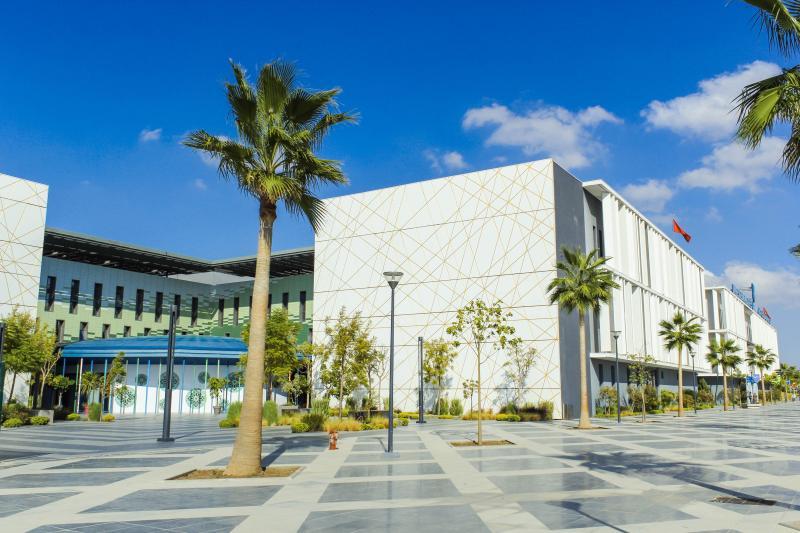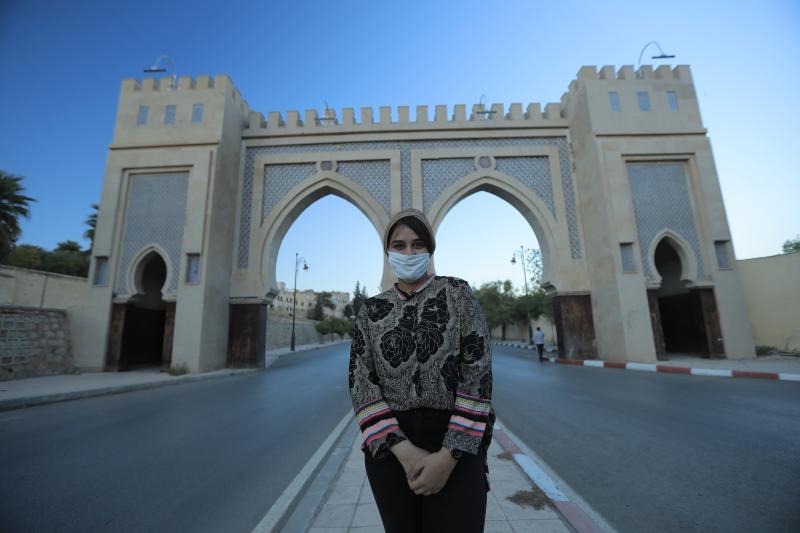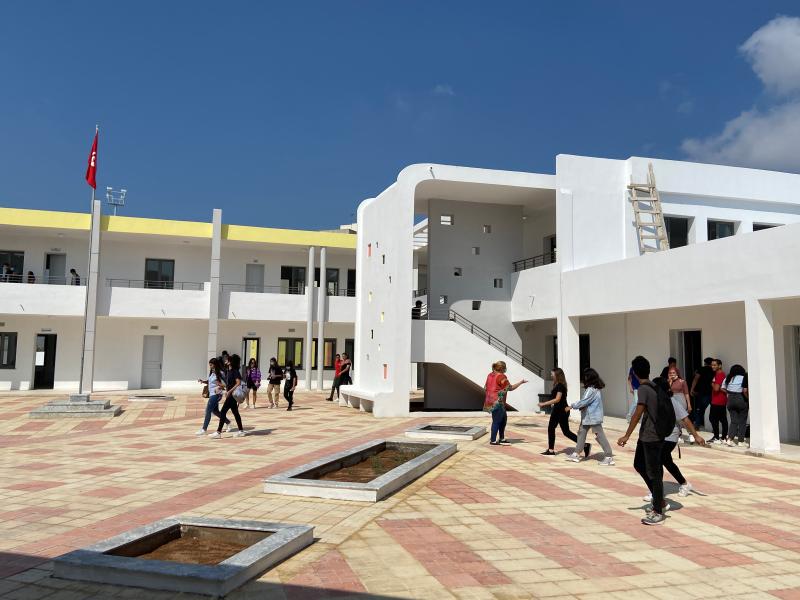قد يعاني التعليم جراء الإغلاق العام الناجم عن كوفيد-19. وبالرغم من ذلك؛ تحرك كلٌ من المغرب وتونس سريعًا لتوفير ما يحتاجه الطلاب لاستمرار التعلم
من المفترض أن ينعم المراهق في حياته بمزيدٍ من الاستقلالية. فيصعبُ عليه تقبل فُقدان هذه الاستقلالية (الحرية)، في غضونِ ذلكَ الإغلاق العام. وعندما سُئلت وفاء حرير، الطالبة في قسم الهندسة الرقمية والذكاء الاصطناعي، الجامعة الأورومتوسطية بفاس بالمغرب، عن شعورها خلال المكوث بالبيت وعدم الذهاب إلى المدرسة أو أي مكانٍ آخر، قالت: "أشعر بالوحدة والقلق والخمول".
وعندما أَجبرت هذه الجائحة المدارس في المغرب على الإغلاق، سعت الجامعة الأورومتوسطية بفاس جاهدةً لتوفير فصول دراسية للطلاب عبر الإنترنت. ولكنَّ التعليم عن بعد لم يكن بالأمر السهل بالنسبة للكثير من الطلاب، مثل: حرير المُقيمة في بولمان، وهي قريةٌ صغيرةٌ تقع على بعد 100كم جنوب فاس تقريبًا. حيث قالت :"الاتصال بطئٌ ومتقطعٌ، والموقع كان يتعطل" ومما زادَ الأَمر سُوءًا ارتفاع تكلفة اتصال الهاتف المحمول بالإنترنت للالتحاق بهذه الفصول المتاحة عبر الإنترنت.
فلا تمتلك حرير وأكثر من 400 طالب آخرون مقيدون في الجامعة، الكمبيوتر المحمول الخاص بهم أو اتصالًا بالإنترنت يُمكن الاعتماد عليه. قَدمت الجامعة طلبًا خاصًا للحصول على المساعدة من الاتحاد الأوروبي، حيث إنَّ البنك قد مول بالفعل إنشاءاتها مع الاتحاد الأوروبي. تبرع بنك الاستثمار الأوروبي ووفد الاتحاد الأوروبي في المغرب، بمبلغٍ يورو من المفوضية الأوروبية، من أجل مساعدة الطلاب على العمل من المنزل. 500.000

The Euromed University of Fes in Morocco
“The COVID-19 pandemic plunged students’ dreams into uncertainty,” says Didier Bosman, a senior EIB engineer who worked long hours to make this deal possible. “Our goal was not to bring things back to normal, but to offer deserving students a new normal in which to learn and thrive.”
Despite the growing education emergency, help for schoolchildren has sometimes been an afterthought when countries and institutions search for ways to address the pandemic. For Bosman, he could not bear the idea that hundreds of students get shut out of an education during the lockdown.
A few weeks after the EU donation, 420 laptops offering unlimited internet access for a year were delivered to Euromed University students who did not have computers and who lived in remote and poorly connected areas.
Our goal was not to bring things back to normal, but to offer deserving students a new normal in which to learn and thrive
Keeping the doors open for boys and girls
The crisis has intensified inequalities that already existed in education systems. For example, boys are more likely to have a laptop at home than girls. This Moroccan operation especially targeted girls who needed a computer and internet access.
Nouhayla Chahm, 21 years old, is in her fourth year of civil engineering at the University of Fes. She was able to study there after receiving a scholarship. The free laptop pushed her to work even harder. “I’m grateful to my university and to the European Union for giving me the courage and the energy to keep going,” she says. Because Chahm has top grades, she can keep her laptop for at least three years.

Nouhayla Chahm, student with top grades at the University of Fes, can keep her free laptop for at least three years.
The laptops were distributed in April and May. The grant was approved and distributed much faster than usual, as the EU, the EIB and the Moroccan government worked hard to help the public and private sectors recover quickly. The grant also helped the university buy 3D printers to make hundreds of reusable masks and disposable filters for students and staff.
I’m grateful to my university and to the European Union for giving me the courage and the energy to keep going
Out of trouble in Tunisia
The French novelist Victor Hugo once said that opening a school is the same as closing a prison. In Tunisia, more than a third of the youngsters aged 17 or 18 do not go to high school. Going to school is one of the best ways to keep teenagers from getting into trouble on the streets.
Reopening schools was one of the biggest challenges in Tunisia during and after the country’s lockdowns. When the International School in Tunis announced in September that it was trying to offer classes again in its buildings, Imen Maarouf was looking forward to it, stating that it is “the best news that I’ve had in months.” Another student, Fares Bouhejbu, was shocked when he heard that courses and exams would restart, as he “hadn’t touched a pen for seven months.” Maarouf and Bouhejbu both attend the International School.

The International School in Tunis.
We don’t just finance school walls, we finance education. This is where we play the future of our young Tunisians
Built in 1999, this multicultural public school is undergoing many improvements under a plan to modernise nearly a third of the secondary schools across Tunisia. The €220 million project is being financed by the Tunisian government; the EIB; KfW, the German development bank; and a European Union grant.
After months of lockdown, reopening schools with proper safety measures to prevent the spread of the coronavirus was a big task. Before the summer, as students were preparing to go to school and take their final exams, Tunisia’s Ministry of Education called for urgent help as there were not enough sanitary supplies, such as masks and hand sanitiser, to keep students and teachers safe.
Bosman, the EIB engineer, stepped in once more. He knew that the Bank’s loan agreement for the school improvement project had ended up with an unexpected €8 million surplus, because the Tunisian dinar had depreciated. He proposed that the Bank use part of this surplus to provide urgent sanitary equipment in Tunisia’s schools.
This proposal was accepted enthusiastically by KfW and the European Union. In only a week, 750 000 facemasks and 102 500 litres of hand sanitizer were ordered for 240 000 students, 160 000 teachers and staff.
“We needed to respond quickly,” Bosman says. “And we could do it by reusing money left over from the project, thanks to the precious collaboration of all the partners involved in the operation.”
Sami Mimita, head of the EIB technical assistance part of the school modernisation project in Tunisia, says people need to think about more than just providing school buildings. “We don’t just finance school walls,” he says. “We finance education. This is where we play a big role in the future of young Tunisians.”
